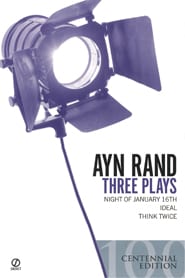

Between 1934 and 1939, Ayn Rand wrote the three original stage plays collected in this volume. Since Night of January 16th is covered as a separate volume on this site, only the other two plays are discussed here.
Ideal grew out of a conversation with a movie fan who gushed that she would give her life to meet a certain famous actress. Dubious, Rand conceived of a story in which the integrity of those who profess to embrace ideals would be tested. What if their idol suddenly appears in their lives, seemingly desperately in need of help, so that their ideals now demand real action?
Think Twice is a murder mystery with a twist. As might be expected, various suspects all have a motive to kill — but not a relatively superficial motive like financial gain or petty jealousy. Rand moves at deeper levels — and the play’s title is meant to be a reminder of this fact.
In Ideal, actress Kay Gonda unexpectedly enters the lives of six of her most ardent admirers, finding them from the addresses on their fan letters. One by one, over a single night and early morning, she visits an upright family man, a social activist, an artist, an evangelist, a wealthy playboy and a lost soul named Johnnie Dawes. To each she pleads for help: she is wanted by police for a murder, and she needs a hiding place. By night’s end, she has tested the integrity of those who claim she is their ideal.
Think Twice presents Walter Breckenridge, physicist and “humanitarian,” on the eve of a much-anticipated public announcement concerning his company’s breakthrough in energy technology. Breckenridge intends to donate it to the world and its governments, without payment or restriction. At his home, surrounded by the objects of his charity, as well as a certain foreign agent, Breckenridge is murdered. Who could have had a motive to kill such a benefactor, and why is murder the only way out?
From Ideal:
Kay Gonda: [Raising her head] . . . If all of you who look at me on the screen hear the things I say and worship me for them — where do I hear them? Where can I hear them, so that I might go on? I want to see, real, living, and in the hours of my own days, that glory I create as an illusion! I want it real! I want to know that there is someone, somewhere, who wants it, too! Or else what is the use of seeing it, and working, and burning oneself for an impossible vision? A spirit, too, needs fuel. It can run dry.
From Think Twice:
Tony: [In the same wise, tired voice] Mr. Hastings, you don’t know what a ghastly weapon kindness can be. When you’re up against an enemy, you can fight him. But when you’re up against a friend, a gentle, kindly, smiling friend — you turn against yourself. You think that you’re low and ungrateful. It’s the best in you that destroys you. That’s what’s horrible about it.
Walter Breckenridge is a prominent physicist and renowned “humanitarian” who claims to seek the good of all mankind in everything he does. We meet him on the eve of his announcement that a breakthrough in energy production technology will be given away, without patent restrictions, to all the world’s people and governments.
The ominous presence of Serge Sookin, a Russian immigrant with no visible means of support, is a reminder of the hazards of making such technology available to oppressive regimes. And what of Breckenridge’s other charitable giveaways, to a child with infantile paralysis, a budding musician who needs schooling, and a struggling actress who needs a theater? What is the effect of his charity on their lives — and can it provide a motive for murder?
Steve Ingalls is Walter Breckenridge’s business partner. “Sixteen years ago,” he tells Breckenridge at one point, “when we formed our partnership and started the Breckenridge Laboratories, I was very young. I did not care for mankind and I did not care for fame. I was willing to give you most of the profits, and all the glory, and your name on my inventions . . . .”
Is there a motive for murder here? Anyone who thinks a mere struggle over money or credit would explain an Ayn Rand mystery has not experienced her unique approach to motivation. The key lies elsewhere, in the deepest recesses of the various suspects’ soul, where self-esteem struggles against the pressure for self-betrayal.
— Steve Ingalls, Think Twice by Ayn Rand
Both Ideal and Think Twice dramatize the value of independence, the virtue of relying solely on one’s own judgment rather than substituting the judgments of other people.
In Ideal, the fans of actress Kay Gonda express their intense admiration in private letters to her. But when Gonda appears at their homes seeking help, these fans become aware of conflicts between their professed ideals and the opinions of others — a nagging wife, a grasping partner, a ruthless competitor — and of the need to choose.
In Think Twice, Walter Breckenridge repeatedly spouts sentiments that command universal public agreement. Yet all the other characters, major and minor, have reason to disagree that Breckenridge’s “humanitarianism” is morally good. As in Ideal, the plot’s events bring each character face-to-face with the need to choose: their own judgments or conventional wisdom. It’s a choice with life-or-death consequences.
On Rand’s view, altruism is not to be confused with benevolence toward others, as expressed by, for example, holding doors for the elderly. In its deepest sense, altruism (literally, “otherism”) is the view that the individual has no right to the pursuit of happiness, only a duty to serve and sacrifice for the sake of others.
In Think Twice, Walter Breckenridge embodies the ideal of altruism in his every action. Through Breckenridge, Rand dramatizes the practical effects of altruism, not only in global politics, but in everyday life, through a series of painful events that give rise to several motives for murder.
On Ayn Rand’s view, crucial to understanding man’s nature is that he possesses free will: the choices one makes throughout one’s life determine one’s values and character. In terms of her mature philosophy, Ayn Rand states the principle as “man is a being of self-made soul.”
In different ways, both Ideal and Think Twice highlight the kinds of moral choices we all face in life, and dramatize the importance and responsibility of forming one’s own values and of striving to realize them in practice.
In Ideal, we witness a number of characters who default on this responsibility — and the emptiness of soul that results. In Think Twice, we see a hero fight for and remain true to actual values, despite enormous risk.